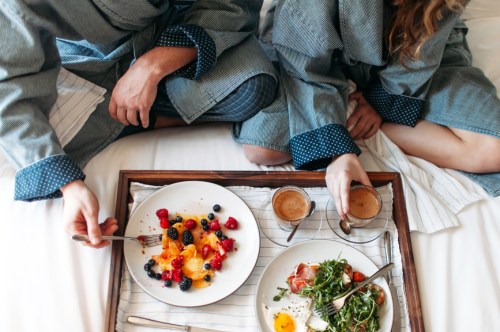Eating More of This Amino Acid Will Help You Get the Highest-Quality Sleep Possible
Uma Naidoo, MD explains how boosting levels of the amino acid GABA, one of the neurotransmitters in our brain, can help you sleep.

If you’ve ever been driven to do something about your restless nights, there’s a decent chance that you’ve supplemented with (or at least considered supplementing with) melatonin. Or, if you prefer a more holistic way to improve your shuteye, you might have foods that contain melatonin stocked in your kitchen. But what if I told you that there’s another nutrient you may want to prioritize in your diet that has the potential to calm your mind, help you unwind, *and* improve sleep quality?
Experts in This Article
Harvard-trained nutritional psychiatrist, professional chef, and nutritional biologist
Enter: gamma amino butyric acid, aka GABA. Keep reading to see what GABA is exactly, how it influences sleep, and the top food sources that contain it.
What is GABA?
Also an amino acid, “GABA is one of the neurotransmitters in our brain which govern mood, cognition, and activity,” begins Uma Naidoo, MD—a Harvard-trained nutritional psychiatrist, professional chef, nutritional biologist, and author of the national and international bestseller, This Is Your Brain on Food. As a reminder, neurotransmitters are chemical substances that facilitate communication amongst brain cells. Some neurotransmitters increase brain activity—such as dopamine, which is associated with arousal and can even be triggered upon the mere thought of a tasty food—whereas others like GABA slow down activity in the brain.
The link between the amino acid GABA, stress, and sleep
“GABA is what’s known as an inhibitory neurotransmitter, which means that it prevents neurons from firing at a basic biochemical sense,” Dr. Naidoo says. Since it reduces neuronal excitability, “the brain ‘calms down,’ so to speak, so that our mood relaxes and we’re able to wind down to sleep.”
If you’ve ever tossed and turned in bed, mulling over a seemingly endless cycle of worries, to-dos, and whatever else might be keeping your brain active when you should be sleeping, boosting your GABA levels has the potential to help out. To start, research demonstrates that certain psychiatric conditions—including but not limited to generalized anxiety disorder and major depression—are associated with low levels of GABA. Moreover, a 2008 study published in the medical journal Sleep found that participants who suffered from primary insomnia had, on average, 30 percent lower brain GABA levels than participants without this chronic sleep disorder; they also demonstrated a greater likelihood of waking up after sleep onset.
Since adequate levels of GABA help us to mellow out, it makes sense that when it’s lacking, our brains are left in cruise control, per se, instead of enabling the brakes to slow things down and allow us to rest and recharge. The result: more stress, rumination, and buzzing brain activity… and less quality shuteye. To address this imbalance, some people opt for GABA supplements to reduce anxiety and improve sleep. While more research is needed to validate supplementary intake on both fronts, a few clinical trials show that GABA supplementation may induce relaxation and lower anxiety, as well as shorten sleep latency (aka the time it takes to fall asleep after getting into bed).
However, it won’t hurt to boost your diet with healthy foods that just so happen to contain GABA. Better yet, they offer a host of additional nutrients that can promote benefits for your mind, mood, and more.
The top GABA foods that may improve sleep, according to a nutritional psychiatrist
To promote greater ease and more restful ZZZ’s with a food-first approach, Dr. Naidoo suggests prioritizing the follow GABA-rich foods in your diet:
- Spinach
- Cruciferous veggies (think broccoli, cauliflower, etc.)
- Sweet potatoes
- Tomatoes
- Brown rice
- White tea
“These colorful, plant-based foods are high in GABA, but also rich in folate and fiber,” she explains. “As a result, these constituents also promote healthy neurotransmitter production while nourishing the gut, potentiating [a more] balanced mood.” On top of that, the rich variety of colors these foods offer indicates that they contain “inflammation-fighting antioxidants, which also benefit brain health,” she continues.
In conclusion, Dr. Naidoo mentions that a consistently balanced diet rich in diverse nutrients can also stand to benefit our daily wake and sleep cycles. In other words, it’s important to not only think of improving your sleep—through specific sleep-friendly foods, supplements, and other contributing factors—as the clock ticks closer to bedtime. With that said, maintaining healthy nighttime eating and drinking habits can surely improve your sleep quality, too. (FTR, while alcohol happens to increase GABA in the brain—hence its calming and sedative effects—experts note that nightcaps are still not a valid sleep remedy, as they’re more likely to hinder rather than help out with the overall quality of your ZZZ’s.)
Sign Up for Our Daily Newsletter
Get all the latest in wellness, trends, food, fitness, beauty, and more delivered right to your inbox.
Got it, you've been added to our email list.










